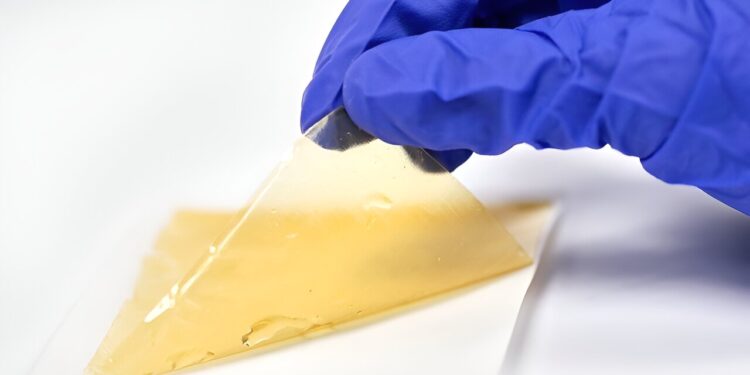Scientists have successfully designed a fatigue-resistant electrolyte membrane that exhibits resistance to cracking and significantly extends the life of fuel cells. Credit: Oakridgelabnews CC BY 2.0
A new approach to addressing environmental challenges is to develop and commercialize robust hydrogen fuel cells. These cells contain a polymer electrolyte membrane that serves as a barrier between electrodes (the conductors that allow electricity to flow through a substance). This membrane conducts protons but inhibits the movement of electrons, hydrogen molecules and oxygen molecules.
When a vehicle accelerates or slows down, the fuel cell operates inconsistently, resulting in variable water production and membrane expansion and contraction. Repetitive deformation over time causes cracks to form, accelerating unwanted transport of hydrogen across the membrane and ultimately causing malfunction.
Some methods used to treat these cracks include radical scavengers and hydrocarbon electrolyte membranes. However, while these approaches provide some protection, they cannot entirely prevent the formation and propagation of these cracks.
Now, in a recent study published in the journal Advanced materialsLed by Associate Professor Sang Moon Kim of Incheon National University and Professor Zhigang Suo of Harvard University, a team of researchers developed a fatigue-resistant polymer electrolyte membrane.
According to Dr. Kim, “To ensure the long-term stable operation of fuel cells, it is essential to develop an electrolyte membrane with high resistance to repetitive fatigue failure that reflects the actual operating environment and degradation process fuel cells. In our study, we used an interpenetrating network to intentionally distribute repetitive stress.
In this study, researchers created a class of fatigue-resistant electrolyte membranes made from an interpenetrating network of Nafion and perfluoropolyether (PFPE). Nafion is a commonly used plastic electrolyte with proton-conducting properties, while PFPE creates a durable rubbery polymer network. The incorporation of rubber slightly reduces the electrochemical performances but significantly improves the fatigue threshold and the lifespan.
The membranes produced had different levels of PFPE; among them, the one with 50% saturation exhibited reasonable electrochemical performance.
Compared to the original Nafion, this Nafion-PFPE membrane raises the fatigue threshold by 175% and extends the life of the fuel cell by 1.7 times. Additionally, the unmodified Nafion membrane has a lifespan of 242 hours, while the composite membrane has a lifespan of 410 hours. These results collectively suggest that incorporation of the rubber network slightly reduces electrochemical performance but significantly improves fatigue resistance and overall service life.
This study is of considerable importance in various applications. The introduction of a fuel cell system offering stability, durability and performance has the potential to pave the way for innovations in various industries. Beyond the realm of fuel cell vehicles, this may impact the development of advanced technologies in the areas of drones, personal aerial vehicles, emergency power sources, forklifts, bicycles, scooters, etc.
“Furthermore, the strategy to improve fatigue resistance can be extended and applied to ion filters, battery separators and actuation systems. This enables wide application in high durability and long life desalination filters, flow battery separators, lithium metal battery separators, and artificial muscles,” explains Dr. Kim.
More information:
Minju Kim et al, Fatigue-resistant polymer electrolyte membranes for fuel cells, Advanced materials (2024). DOI: 10.1002/adma.202308288
Provided by Incheon National University
Quote: Research team improves fuel cell durability with fatigue-resistant membranes (February 6, 2024) retrieved February 6, 2024 from
This document is subject to copyright. Apart from fair use for private study or research purposes, no part may be reproduced without written permission. The content is provided for information only.



